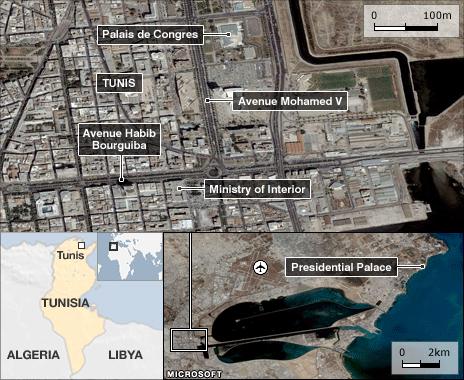Tunisia: President Zine al-Abidine Ben Ali forced out
- Published
Police fired tear gas at the protesters outside the interior ministry
Tunisian President Zine al-Abidine Ben Ali has stepped down after 23 years in power as protests over economic issues snowballed into rallies against him.
Prime Minister Mohammed Ghannouchi has taken over as interim president, and a state of emergency has been declared.
Mr Ben Ali left Tunisia with his family, and has since arrived in Saudi Arabia, officials said.
Earlier, French media said President Nicolas Sarkozy had rejected a request for his plane to land in France.
Dozens of people have died in recent weeks as unrest has swept the country and security forces have cracked down on demonstrations over unemployment, food price rises and corruption.
'Welcomed'
A Saudi palace statement said Mr Ben Ali arrived in the country early on Saturday, according to the official SPA news agency.
"Out of concern for the exceptional circumstances facing the brotherly Tunisian people and in support of the security and stability of their country... the Saudi government has welcomed President Zine El Abidine Ben Ali and his family to the kingdom," the statement said.
The protests started after an unemployed graduate set himself on fire when police tried to prevent him from selling vegetables without a permit. He died a few weeks later.
Demonstrations came to a head on Friday as thousands of people gathered outside the interior ministry, a symbol of the regime, and many climbed onto its roof. Police responded with volleys of tear-gas grenades.
President Ben Ali, who had already promised to step down in 2014, dissolved his government and the country's parliament, and declared a state of emergency.
Then, in a televised address on Friday afternoon, the prime minister announced that he would be taking over from President Ben Ali.
Mr Ghannouchi, 69, a former finance minister who has been prime minister since 1999, promised to "respect the law and to carry out the political, economic and social reforms that have been announced".
Prime Minister Mohammed Ghannouchi: 'I assume responsibilities of the President'
Witnesses say soldiers have begun taking down portraits of Mr Ben Ali - an ubiquitous sign of his authoritarian rule - from billboards and on the walls of public buildings around the country.
A BBC Arab affairs analyst, Magdi Abdelhadi, says Mr Ben Ali's demise may rattle the entire post-colonial order in North Africa and the wider Arab world.
Stranded tourists
The state of emergency decree bans gatherings of more than three people and imposes a night-time curfew. Security forces have been authorised to open fire on people not obeying their orders.
President Sarkozy said he stood side-by-side with the citizens of Tunisia, his country's former protectorate.
"Only dialogue can bring a democratic and lasting solution to the current crisis," said Mr Sarkozy in a statement.
US President Barack Obama condemned violence against Tunisian citizens "peacefully voicing their opinion in Tunisia".
In a statement, external, he said: "I applaud the courage and dignity of the Tunisian people.
"I urge all parties to maintain calm and avoid violence, and call on the Tunisian government to respect human rights, and to hold free and fair elections in the near future that reflect the true will and aspirations of the Tunisian people."
UK travel agents have scrambled to pull hundreds of tourists out of the country, and companies including Thomson, First Choice and Thomas Cook have cancelled flights scheduled to leave for Monastir on Sunday.
The UK, the US and France are among the countries advising against non-essential travel to Tunisia.
"The situation is unpredictable and there is the potential for violence to flare up, raising the risk of getting caught up in demonstrations," the UK Foreign Office said in its latest travel advisory, external.
Mr Ben Ali, 74, was only Tunisia's second president since independence from France in 1956. He was last re-elected in 2009 with 89.62% of the vote.
